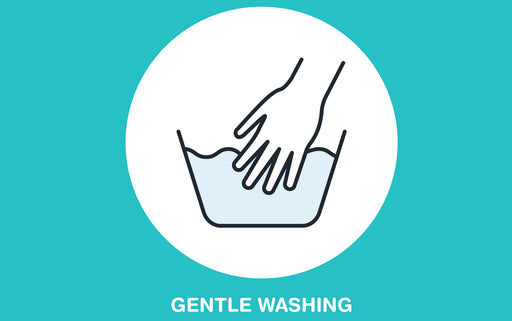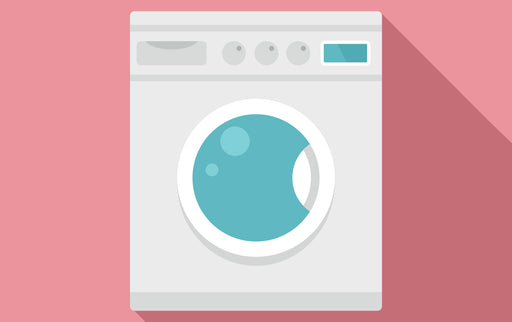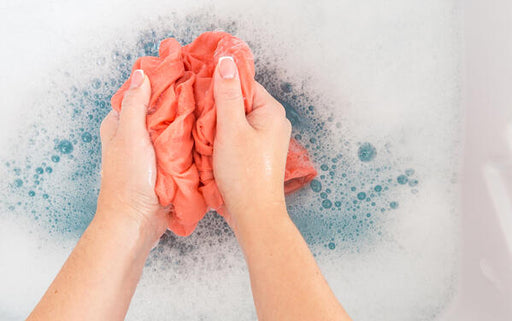The Hand Wash Cycle On A Washing Machine

We know - washing your clothes by hand can be a painstaking process even if the steps themselves are straightforward and simple. It’s okay if you want to cut some corners! Many modern-day washing machines can help you do just that with most of your hand-wash only clothing.
Quick Review: What Does Hand Wash Mean?
Of course, the obvious answer involves little mystery - but the reasons behind hand washing can help you make sense of how seriously you should take a label’s “hand-wash only” instructions and when it’s safe to toss it in the machine for a hand-wash cycle, instead.
You can expect any item that needs hand-washing to be made of a material, or with a technique, that can be damaged by excessive temperatures, agitation or harsh chemicals. “Hand-wash only” is a red flag for the consumer to know this fabric needs special care and close attention for one, some or all of these reasons.
This could be traced back to early developments in washing machines, which were quite vigorous in their duty to make cleaning clothes quick and painless. Unfortunately, the painless part didn’t include considerations for the constitution of every kind of clothing, and so natural fabrics or intricately woven or decorated pieces were deemed delicate and therefore in need of hand-wash only care.
Fortunately, the market heard the cry of the laundry-burdened but fashion-conscious consumers and began making machines with a lighter touch. These days, these features that mimic hand-washing are definitely gentler than their earliest predecessors - but they’re not always the perfect answer in every case.
Get to Know Your Washing Machine
First, let’s understand some of the basics about washing machines so you can figure out which of your delicate garments can be cleaned in a washing machine’s hand-wash cycle.

Washing Machine Types
You can distinguish washing machine types by the way in which you load the clothes, and whether or not the machine uses an agitator. Front-loading washing machines do not use an agitator, but some top-loading ones do. Fans of front-loading machines usually prefer them because they save on space, they can stack with a dryer, and they can handle fairly bulky loads.
Those who prefer machines you load from the top tend to like a more straightforward set of controls and have smaller or less-bulky loads of laundry to do. Agitators seem to be preferred by anyone who has laundry that needs heavy-duty cleaning, while machines without agitators are better for large items like blankets or lots of delicate items that need as little disturbance while cleaning as possible.
Common Cycle Setting Questions
You can expect to find a variety of detailed settings on any washing machine these days - fine-tuning each cycle is the name of the game for the modern-day market. But, the fundamental function of a washing machine remains the same across all brands. You should be able to change the temperature of the water used during each cycle, the intensity of that cycle, and whether or not the cycle finishes with a spin-dry to remove excess water.
- What role does temperature play? If your machine is hooked up to the hot water tap and has hot-water settings, you’ll want to use those settings for loads of laundry that may be excessively dirty - provided they’re not made out of fabrics that can shrink in hot water, like cashmere or merino wool. Most clothes that would be found in a delicate or hand-wash cycle probably caution against the use of hot water, but check the labels to be sure.
- Is the delicate cycle the same as hand wash? Manufacturers aren’t required to use the same names for settings from one machine to the next, so you may find this setting under different names, like “delicate” or “gentle”. Unless the machine’s manual says otherwise, you can treat the “delicate” setting the same as a “hand wash” setting.
- Is the spin cycle safe for hand-wash only clothes? It’s tough to make a definitive call on this because it depends on how the manufacturer has built their machine to behave during a delicate wash - some will pair a gentler spin cycle with the delicate wash setting while others will allow you to choose a gentle spin. Others don’t make a distinction. There is some amount of stretch possible during a spin cycle, so if you’re washing clothes that can become easily misshapen, you may want to skip the spin.

Supplies You Need for Hand Washing In A Machine
You can expect to use the same supplies for machine-washing your delicate clothes as you do when you hand-wash them yourself. Here’s a quick rundown of the basics, but you can always revisit our hand-washing instructions for your favorite garment type for more specifics.
Stain removers
Stain removal can be both a process and a product. In some cases, you can just spot-treat stains with a concentrated dollop of your usual detergent. Other, more stubborn stains may need some elbow grease or a special soak. Unless you’re absolutely certain your garment won’t be harmed by a bleach or bleach-like substance, avoid using these harsh chemicals for items you’re putting in a delicate wash.
Detergents
If you’re washing extremely delicate items or pure and precious wools and wool blends, you will be better off picking a detergent that specifically states it is wool-safe. Otherwise, most of the laundry detergents you find in the stores these days are mild enough for all items. You should just steer clear of any detergents that contain bleach, when necessary.
Conditioners
Conditioners aren’t appropriate for all delicate, hand-wash only clothes, but they can be an important step for some items. For this decision, always consult the care instructions on your garment’s label, first. Some life-hackers promote using regular hair conditioner on natural fibers like wool, reasoning that it’s a hair and therefore would benefit from conditioning - but consider there may be risks inherent in this choice. As with our own hair, product build-up can lead to dullness and breakage.
Mesh laundry bags
Even if your machine’s delicate cycle is so gentle it could wash a flower and not disturb a petal, your hand-wash only clothes will fare all the better when you use a mesh laundry bag. These come in a variety of sizes, so choose a few that fit your needs best. Clothes should have enough wiggle room that water can move through the layers easily, but not so much room that clothing can become stretched or misshapen within the bag itself.
Hand-washing vs. Machine Washing: Which One Wins?


Ultimately, it’s up to you to weigh which factors are most important for each delicate garment in your collection. Here are some basic guidelines for when to choose which type of washing method.
Hand washing delicates may work best for:
- Vintage and antique pieces of clothing that need extra care (read more about how to clean vintage clothes)
- Heavily embellished and embroidered items
- Any intricately woven item that can tangle with itself, like fringe
- Garments that can become misshapen easily if stretched
Washing delicates by machine may work best for:
- Modern-made clothing with synthetic blends that help hold its shape
- Small items made from natural wool fibers, like socks, gloves and hats
- Bulky items like sweaters, if they are not embellished or vintage
If you have a lot of hand-wash only garments but can only toss some of them into the delicate cycle of your machine, try to keep them separated both where they belong in your closet and where they’re kept while waiting to be laundered. This helps you avoid mixing things up when it comes time to get the laundry done.
It’s also important to note that machine-washing clothes is not automatically better at cleaning certain substances off of a garment’s fibers when compared to hand-washing. Remnants of perspiration can persist even after a wash cycle, but you may not see the tell-tale yellowing stain it leaves until it’s sat in storage for a while.
This may not seem like a big deal to some, but a stain like that means clothing may be vulnerable to clothes moth infestation - which is why it’s so important to bring your long-term stored items out for an occasional off-season cleaning even if they looked pristine going into storage - where of course you've got a Pheromone Clothing Moth Trap hanging right?

Remember, when in doubt - hand-wash it out. Most machines that feature a delicate or hand-wash cycle are great for a lot of basic or durable items, and their convenience can’t be beat. But, they won’t work for every type of garment, so wash carefully!
Done with washing? Read our blog post on storing delicate clothes!
About MothPrevention
MothPrevention® speak to customers every day about their clothes moth issues - clothes moths are a species that are ever increasing and that can cause significant damage to clothes, carpets and other home textiles.
To date, we’ve helped over 250,000 customers deal with their moth problems. We have developed professional grade solutions including proprietary pheromones and trap design, not available from anybody else in the USA.





